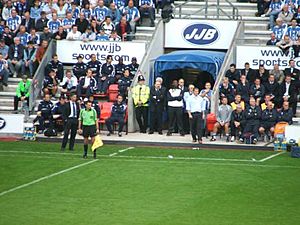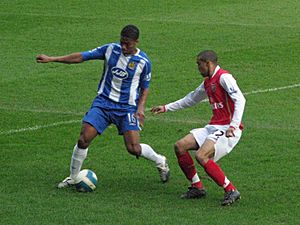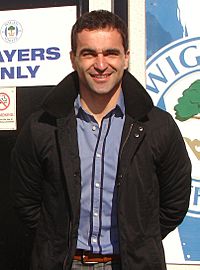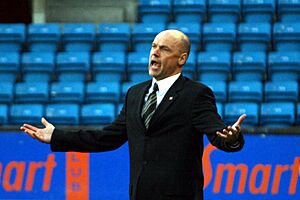History of Wigan Athletic F.C. facts for kids
The history of Wigan Athletic Football Club began in 1932 when the club was formed. They joined The Football League in 1978 and reached the top division, the Premier League, for the first time in 2005. They stayed there for eight years. Their biggest win was the 2013 FA Cup Final in 2013. In the same year, they were relegated from the Premier League. Since then, the club has moved between the EFL Championship and League One, sometimes due to money problems.
Contents
Early Days and Local Leagues (1932–1978)
Wigan Athletic was created in 1932. This happened after an older club, Wigan Borough, closed down. Wigan Athletic bought their old home ground, Springfield Park, for £2,850.
Even though their first try was rejected, Wigan Athletic joined the Cheshire County League. On 27 August 1932, they played their first league game against Port Vale Reserves. The team wore red and white shirts with black shorts.
Wigan Athletic won their first trophy in the 1933–34 season, becoming champions of the Cheshire League. The next season, they won the league again. They also entered the FA Cup for the first time. They beat Carlisle United 6–1. This was a record for the biggest win by a non-league club over a league club in the FA Cup. In the 1935–36 season, they won their third Cheshire League title in a row.
After World War II, Wigan Athletic started wearing their well-known blue and white kit. In 1950, they almost joined The Football League but just missed out. In the 1953–54 season, Wigan played an FA Cup match against Hereford United. A huge crowd of 27,526 watched the game. This was a record for a match between two non-league teams at a non-league ground. In the next round, Wigan Athletic played First Division team Newcastle United. Wigan drew 2–2 away from home but lost the replay 3–2.
In the 1964–65 season, Wigan Athletic won their first Cheshire League title since returning to the league. Their top scorer, Harry Lyon, scored 66 goals. Lyon became Wigan Athletic's all-time leading goalscorer. In 1968, Wigan Athletic helped start the Northern Premier League. They won this league in 1970–71. After 34 tries, Wigan Athletic was finally voted into the Football League in 1978.
The first game played under floodlights at Springfield Park was on 19 October 1966. Wigan Athletic played Crewe Alexandra. The official opening of the floodlights was on 24 October, when Manchester City visited.
In 1973, Wigan played their first match at Wembley Stadium in the 1973 FA Trophy Final. They lost 2–1 to Scarborough.
Joining the Football League (1978–1995)
|
|
| Wigan Athletic's original league kit |
In the 1977–78 season, Wigan Athletic finished second. At that time, clubs had to be voted into the Football League. Southport was voted out, and Wigan Athletic was voted in on 2 June 1978. This made Wigan Athletic a Football League club.
In their first League season, Wigan Athletic finished sixth. They earned their first Football League promotion in 1981–82 under manager Larry Lloyd. They joined the old Division Three for the first time. The club won its first trophy as a League club in 1985 with the Freight Rover Trophy.
The 1985–86 season saw Wigan Athletic finish fourth. This was a club record high for 17 years. The next season, 1986–87, they finished fourth again. This time, they got to play in the new play-off system for promotion. However, they lost in the semi-finals to Swindon.
After these good seasons, Wigan Athletic spent several years in the middle of the table. They were relegated for the first time in their League history in 1992–93. Attendances at games also dropped. The club finished 19th in the fourth tier a year later, which is their lowest-ever League finish.
Rising Through the Leagues (1995–2005)
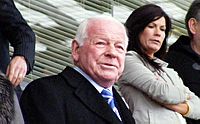
In February 1995, local millionaire Dave Whelan bought the club. He brought three Spanish players to the club: Roberto Martínez, Isidro Díaz, and Jesús Seba. They were called 'The Three Amigos'. They became a symbol of Whelan's big plan to get Wigan Athletic into the Premier League.
In the 1996–97 season, Wigan Athletic became Division Three champions. They won on the last day of the season. Graeme Jones scored a club record 31 league goals that season.
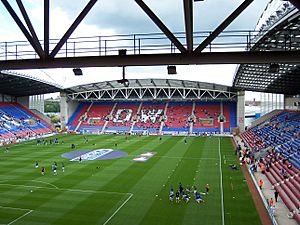
In 1999, Wigan won the Football League Trophy, beating Millwall 1–0 at Wembley Stadium. In the same season, they reached the Division Two play-offs but lost to Manchester City. They reached the play-off final again in 2000 but lost to Gillingham.
In the summer of 2001, Paul Jewell became the manager. His second season was much better. Wigan Athletic reached the quarter-finals of the League Cup. They beat Premier League teams like West Brom and Manchester City. Wigan Athletic won the Division Two championship in 2002–03 with 100 points. They lost only four times all season. This meant Wigan Athletic was promoted to the second tier of English football for the first time.
In their first season in the second tier, Wigan Athletic went unbeaten for 17 games. They finished seventh, just missing out on the play-offs.
The next season, 2004–05, they were unbeaten for the first 17 games again. On the last day of the season, Wigan needed a draw against Reading to get the last automatic promotion spot. A 3–1 win in front of their home fans at the JJB Stadium earned Wigan Athletic promotion to the top division of English football for the first time in their 73-year history.
Premier League Years (2005–2013)
Wigan's first Premier League game was at home against champions Chelsea. They lost 1–0 after a late goal. Wigan then had a good run and were second in the league by November. They also reached their first major cup final in the Football League Cup. In the final, Wigan lost 4–0 to Manchester United. Wigan Athletic finished the 2005–06 season in 10th place. This is still the club's highest-ever league finish.
In the 2006–07 season, Wigan faced the threat of relegation. On the final day, Wigan won 2–1 away against Sheffield United. This win kept them in the Premier League and sent Sheffield United down instead. After this, manager Paul Jewell resigned.
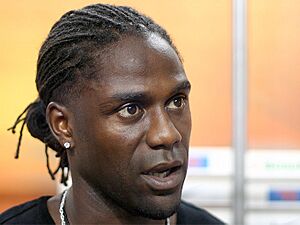
The 2007–08 season started well, with Wigan topping the Premier League after three games. However, injuries and a losing streak meant Wigan fell into the relegation zone. Chairman Dave Whelan decided to sack manager Chris Hutchings.
Steve Bruce returned to Wigan as manager. He helped Wigan finish 14th, which was a comfortable position.
In the summer of 2008, the team's kits changed. Bruce continued to change the squad. Wigan finished the season in 11th place, their second-best Premier League finish. In June, Bruce left Wigan for a second time. In July, Antonio Valencia was sold to Manchester United for £16 million. This was Wigan's biggest transfer deal.
Roberto Martínez Era (2009–2013)
Wigan appointed Roberto Martínez, a former player, as manager before the 2009–10 Premier League season. On 15 August 2009, Wigan won their first game of the season, beating Aston Villa 2–0. On 26 September, Wigan got their first win against a "Big 4" team, beating Chelsea 3–1.
On 22 November 2009, Tottenham Hotspur beat Wigan 9–1. This was Wigan's largest defeat as a league club.
A strong finish to the season, including a 1–0 win over Liverpool and a 3–2 win over Arsenal, helped Wigan avoid relegation again.
At the start of the 2010–11 season, Wigan lost 4–0 to Blackpool and 6–0 to Chelsea. Despite being in the bottom three for most of the season, Wigan Athletic stayed in the Premier League on the last day. They beat Stoke City away from home. On 7 May, Wigan Athletic secured their Premier League status and sent Blackburn Rovers down with a 1–0 victory.
After beating Everton and Millwall, Wigan reached the FA Cup Final for the first time. In the Final at Wembley Stadium, Wigan beat Manchester City 1–0. Ben Watson scored the winning goal in injury time.
Wigan's first major trophy also gave them a spot in the Europa League. However, three days later, Wigan Athletic lost to Arsenal and were relegated from the Premier League. They became the first team to win the FA Cup and be relegated in the same season.
On 5 June, Roberto Martínez left Wigan to manage Everton.
Recent History (2013–Present)
On 14 June 2013, Owen Coyle became the new Wigan manager. On 19 September, the club played their first game in a European competition. They drew 0–0 away to Zulte Waregem in the UEFA Europa League group stage. Coyle left the club in December 2013.
Uwe Rösler was appointed as the new manager. His first match was a defeat in the Europa League, which meant the club was out of the competition. On 9 March 2014, Wigan beat Manchester City in the FA Cup. This sent them to the semi-final at Wembley for the second year in a row. They lost to Arsenal on penalties. Wigan finished 5th in the Championship but lost in the play-offs to Queens Park Rangers.
Rösler was sacked in November 2014. Malky Mackay replaced him. In April 2015, with Wigan in danger of relegation, Mackay was sacked. Former Wigan captain Gary Caldwell took over. Despite a late fight, the team was relegated at the end of the 2014–15 season.
Caldwell rebuilt the team. The 2015–16 season saw them win the League One title. This meant they returned to the Championship right away. Will Grigg was the league's top scorer. Caldwell was later sacked after a poor start to the Championship season. Paul Cook became manager at the end of the season.
In the 2017–18 League One season, Wigan finished top again. They won promotion back to the Championship. In the 2017–18 FA Cup, Wigan beat Manchester City 1–0. Will Grigg scored the winning goal. At the end of the season, the Whelan family sold the club to International Entertainment Corporation (IEC). This ended 23 years of Whelan family ownership.
In the 2018–19 season, Wigan finished 18th in the Championship, safely away from the relegation zone.
Financial Problems and Comebacks (2020–2022)
On 1 July 2020, the club announced it had gone into administration. This meant they faced a 12-point deduction. This deduction would be applied at the end of the 2019–20 season. The club was in 14th place at the time. The administrators said they would investigate how this happened so soon after the club changed owners. Many non-playing staff were made redundant. Players were also sold to help with money problems.
On 7 July 2020, the club appealed against the 12-point deduction. On 14 July, Wigan had their biggest League victory, beating Hull City 8–0. This win meant Wigan would not finish in the relegation places before the deduction. However, the 12-point deduction pushed Wigan into the bottom three. This meant the club would play in League One if their appeal failed. On 4 August, the club's relegation was confirmed.
The administrators tried to find a new owner. On 30 September, they reached an agreement with a bidder from Spain. However, this deal fell through in January 2021. By March 2021, the administrators were in talks with a group called Phoenix 2021 Ltd, led by businessmen from Bahrain. A takeover was agreed on 15 March and approved by the EFL on 30 March 2021.
The club finished the 2020–21 season in 20th place, just above the relegation spots. A year later, Wigan Athletic won the League One title in 2021–22. They earned promotion back to the Championship after a 3–0 win at Shrewsbury Town on the final day.
More Financial Issues and a New Owner (2023)
In March 2023, Wigan reported a financial loss. The club also faced delays in paying players' wages. The EFL docked Wigan three points for failing to pay players. This had happened before. Players protested the financial problems. On 29 April 2023, Wigan was relegated from the Championship. Wage delays continued.
In late May 2023, Wigan was hit with two more points deductions for the upcoming 2023–24 League One season. First, four points were deducted for not paying players' wages. A further four-point deduction was put on hold, but would be triggered if wages were late again. Second, another four points were deducted because the owner missed a deadline to deposit money. This meant the club would start its next season with minus eight points.
Fears grew about the club's future. On 12 June 2023, it was reported that Mike Danson, co-owner of Wigan Warriors RLFC, was interested in buying Wigan Athletic. The takeover was confirmed on 14 June.
 | Madam C. J. Walker |
 | Janet Emerson Bashen |
 | Annie Turnbo Malone |
 | Maggie L. Walker |


